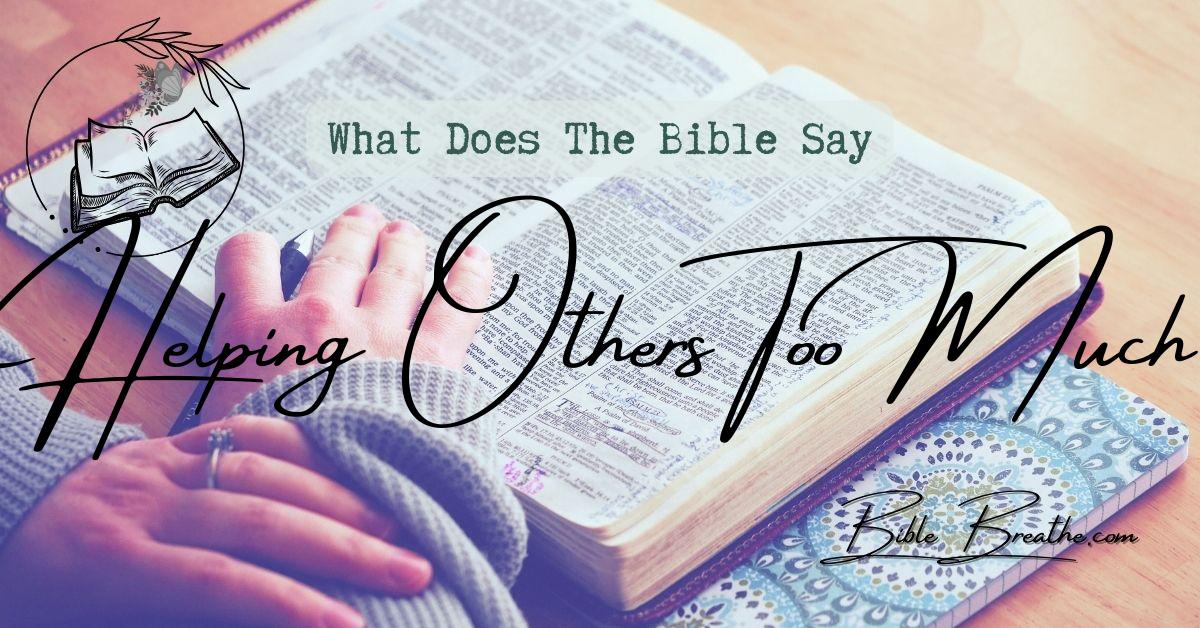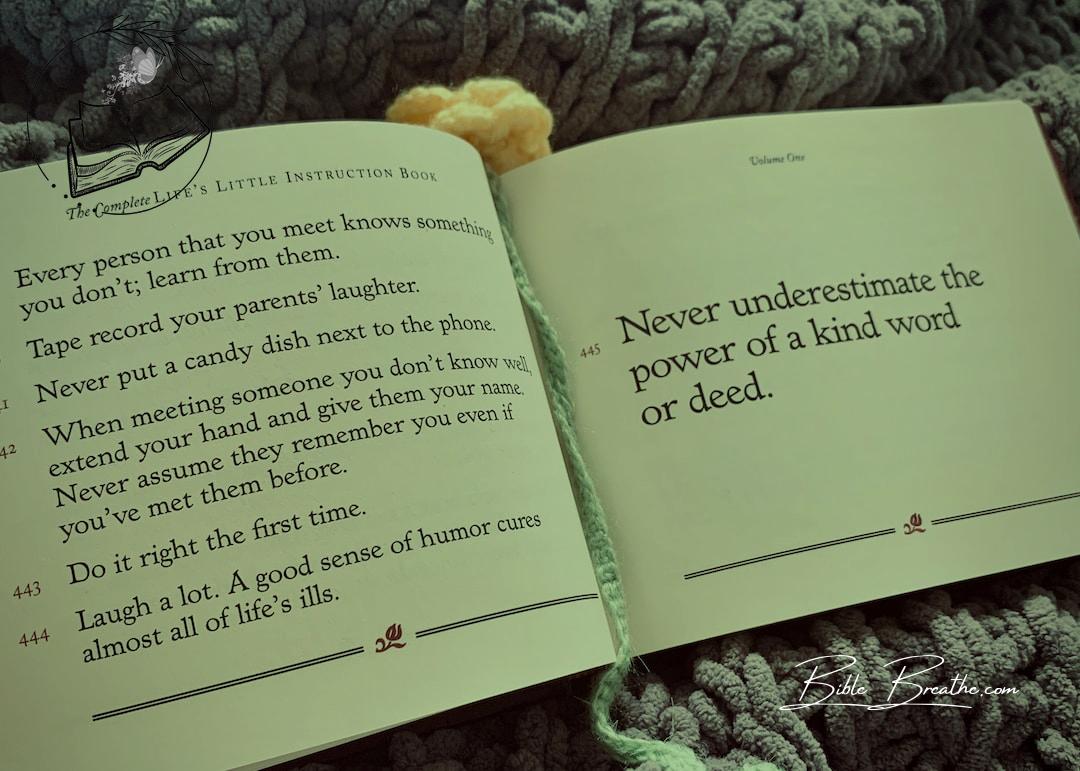What’s the deal with the Bible and helping others too much, fam?
It’s like being a Good Samaritan, right?
The Bible’s got this whole playbook on helping, but there’s a twist.
You’ve got to keep it real with that genuine help, no cap.
The Scriptures push us to drop some knowledge on cheerful giving, compassion, and being selfless.
It’s all about that love and kindness, but here’s the kicker – don’t go overboard, getting caught up in that over-helping drama, or letting folks take advantage of you.
Think of it like this: the Bible’s all about being a blessing, not a doormat.
It’s like a wisdom treasure map, helping us navigate the fine line between aiding the less fortunate and keeping it a hundred.
So, join me on this faith journey as we break it down, the Bible way, and find that sweet spot, fam.
🙌📖💖
Key Takeaways
- So, what does the Bible say about helping others too much? It’s all about striking a balance between genuine help and setting healthy boundaries.
- The importance of discernment is highlighted in the Bible. It’s crucial to help in a way that truly benefits others and doesn’t enable harmful behavior.
- Christians are called to do good deeds with pure motives, not seeking recognition but genuinely serving others.
- Remember, it’s not about helping too much or too little; it’s about helping wisely and with love.
Let’s Break Down the Bible’s Take on Giving Too Much
Photo modified by BibleBreathe.com. Original photo by Katie Rainbow 🏳️🌈 on Unsplash
Hey there, amazing people!
Let’s unpack a burning question: can you ever be too giving, especially from a biblical angle?
The Good Book sure has some wisdom on this.
God’s Heart on Being Generous
God’s all about us showing love and compassion.
It’s like when your friend needs a snack and you gladly share your fries – that’s love in action!
Finding that Sweet Spot: 2 Corinthians 9:7
In 2 Corinthians 9:7, Paul’s saying, “Hey, it’s about what’s in your heart.”
Giving should make you as happy as nailing that tricky skateboarding move.
God loves a cheerful giver!
Learning from the Good Samaritan Story
Ever heard of the Good Samaritan?
This story in Luke 10:32-33 paints a vivid picture.
Imagine you’re stranded on the road, and a kind stranger helps you change a flat tire.
That’s the level of help we’re talking about – going above and beyond when needed.
But here’s the deal: being generous doesn’t mean being a doormat or a pushover.
God wants us to be wise, like how you’d carefully choose your player in a video game.
So, how do we balance being giving and being wise? Well, God’s got it sorted. Give from your heart, be joyful, and remember, what you give will come back to you in abundance. – Luke 6:38 (KJV) 🌟
Being generous is awesome, just like doing a perfect slam dunk.
But let’s be smart about it, ensuring we’re lifting others up without tripping ourselves!
💪
Finding the Right Balance: Helping vs. Enabling – A Biblical Perspective
Photo modified by BibleBreathe.com. Original photo by Jéan Béller on Unsplash
Hey there, my friends!
You know, in life, we all want to lend a hand, to be there for others when they’re in a tough spot.
But have you ever asked yourself, can you actually help someone too much?
Today, we’re diving deep into this, and we’re looking at what the Bible has to say about it.
Striking the Right Chord Between Helping and Enabling
Helping and enabling might sound like cousins, but they’re more like distant relatives.
Helping is like giving someone a boost when they’re down, helping them stand on their own two feet.
It’s like teaching them to fish so they can eat for a lifetime.
Enabling, on the other hand, is like carrying someone on your back all the time, even when they’re perfectly capable of walking.
It’s like giving them fish every day but never teaching them how to fish themselves.
The Bible gives us some solid guidance on this.
In 2 Thessalonians 3:10-12, it says:
“For even when we were with you, this we commanded you, that if any would not work, neither should he eat. For we hear that there are some which walk among you disorderly, working not at all, but are busybodies. Now them that are such we command and exhort by our Lord Jesus Christ, that with quietness they work, and eat their own bread.” – 2 Thessalonians 3:10-12 (KJV)
Now, that’s a no-nonsense way of telling us that being idle isn’t the way to go.
The Bible stresses the importance of work and self-sufficiency.
It’s not about turning your back on folks in need, but it’s about motivating them to stand on their own two feet.
The Nudge to Be Self-Sufficient
1 Thessalonians 4:11 doubles down on the message of self-sufficiency:
“And that ye study to be quiet, and to do your own business, and to work with your own hands, as we commanded you.” – 1 Thessalonians 4:11 (KJV)
This verse encourages us to work diligently and be self-sufficient.
It’s not saying we shouldn’t help those in need, but it’s emphasizing that individuals should be able to take care of themselves through their own hard work.
Using Wisdom in Our Acts of Kindness
So, what’s the deal with helping others too much?
The Bible tells us to be smart and wise about it.
While helping is a beautiful thing, enabling can actually hinder personal growth and responsibility.
We’re encouraged to give with a cheerful heart, but also to promote self-sufficiency.
Think about the parable of the Good Samaritan.
He didn’t just throw money at the wounded man and call it a day.
He took action, showed kindness, but he didn’t take over the injured man’s life.
It’s about compassion, but it’s also about giving folks the space to grow.
In a nutshell, the Bible’s guiding us to be kind and compassionate, but also to be wise in our efforts to help others.
Balancing our desire to assist with the wisdom to encourage self-sufficiency is the key to living out the biblical principles of helping.
What Does the Bible Say About Helping Others Too Much?
Photo modified by BibleBreathe.com. Original photo by Masjid Pogung Dalangan on Unsplash
Hey there, fam!
Today, we’re gonna dive into a topic that often tugs at our heartstrings – helping others.
But is it possible to help folks a bit too much?
Let’s unravel this together.
Wisdom Meets Innocence
So, Jesus drops some real talk in Matthew 10:16, saying, > “Behold, I send you forth as sheep in the midst of wolves: be ye therefore wise as serpents and harmless as doves.” – Matthew 10:16 (KJV).
Imagine you’re out in the wild, and you’re a shepherd with a flock of sheep.
But guess what?
There are wolves lurking around.
You gotta be smart like a serpent, watch your back, and protect your flock.
But don’t forget to be gentle and pure like doves.
This verse tells us that while helping is amazing, we gotta be wise, or people might take advantage of our kindness.
Just like the shepherd guarding the sheep, we should guard our hearts and wellbeing while still helping those in need.
Seeking Wisdom from the Man Upstairs
Now, check out James 1:5.
It goes like this: > “If any of you lack wisdom, let him ask of God, that giveth to all men liberally, and upbraideth not; and it shall be given him.” – James 1:5 (KJV).
Think of it as having a treasure chest filled with wisdom, and God’s the one holding the key.
When you’re unsure whether you’re going overboard with your help, it’s time to tap into that divine wisdom.
God’s got that never-ending source of wisdom, and He’s willing to share.
This divine guidance can help you figure out if you’re genuinely assisting or enabling someone.
With God’s wisdom, you can make sure your good deeds are a real source of support, not a shortcut to idleness.
The Bible is all about being a Good Samaritan – lending a hand when it’s needed.
But it also warns us about becoming doormats.
In your journey of helping, remember these lessons – be wise, seek divine wisdom, and let your help be filled with cheerfulness and purpose.
Keep these nuggets of wisdom close, and you’ll walk that fine line between genuine help and being taken advantage of.
Let’s navigate this journey together, fam!
When Kindness Gets Complicated: What Does the Bible Say About Helping Others Too Much?
Photo modified by BibleBreathe.com. Original photo by Ram Kishor on Unsplash
Hey there, family!
Today, we’re diving into a topic that many of us wrestle with: How much is too much when it comes to helping others?
The Bible is our guide, and it’s got some powerful insights on this very matter.
A Heart Overflowing with Love
In Deuteronomy 15:7-8, God reminds us not to harden our hearts when we see a brother or sister in need.
It’s like when you spot your friend struggling to carry a heavy load, and you rush in to lend a hand.
God wants us to have hearts full of compassion and open hands to help.
The Principle of Generosity
Proverbs 19:17 is a game-changer.
It tells us that when we lend to the poor, it’s like we’re lending to the Lord.
Imagine this: You’re lending a friend a few bucks, and God says, “I’ll vouch for them!”
Your act of kindness doesn’t go unnoticed.
It’s an invitation to help with a generous spirit, and it’s a beautiful thing.
Going Above and Beyond
Matthew 5:42 challenges us to go the extra mile.
It says, “Give to those who ask, and don’t turn away from those who want to borrow.”
It’s like when someone asks for your coat, and you go, “Here’s the coat, the scarf, and the gloves!”
This verse encourages us not just to meet needs but to exceed expectations.
God’s Heart for the Needy
When we flip through the Psalms, we find countless verses that reveal God’s heart for the needy.
It’s like God being the ultimate Good Samaritan, always ready to lend a hand.
Psalm 146:7 is especially reassuring: “The Lord gives food to the hungry.”
It’s like God has a divine soup kitchen, making sure no one goes to bed hungry.
But here’s the twist: While helping the poor is crucial, the Bible also warns us about enabling idleness.
We’re not meant to be doormats, but we should offer assistance wisely.
Giving without discernment can lead to dependency.
Balancing Act: Wisdom in Giving
The Bible is packed with wisdom.
It’s not just about throwing your good deeds into the world; it’s about making sure they count.
Just like a doctor prescribes the right medicine in the right dose, we need to offer help wisely.
We’re called to be cheerful givers, but we’re not meant to be taken advantage of.
In your journey of helping others, remember to balance your acts of kindness with wisdom.
It’s not about how much you help; it’s about how effectively you make a difference in someone’s life.
It’s about being smart and generous, like Solomon asking for wisdom from God.
It’s about ensuring that your kindness creates real impact.
Striking the Balance: Does the Bible Tell Us to Be a Doormat?
Photo modified by BibleBreathe.com. Original photo by Brett Jordan on Unsplash
Life’s like a seesaw, right?
On one side, we’ve got this burning desire to lend a hand, just like the good book encourages us to.
But on the flip side, we’re left wondering if we’re helping a bit too much, if we’re the world’s welcome mat.
Well, let’s get into the nitty-gritty using the Bible’s wisdom.
Turning the Other Cheek – Matthew 5:38-39
You’ve heard the phrase “turn the other cheek,” haven’t you?
It’s like a divine riddle.
But hold up, it doesn’t mean you should let folks walk all over you.
No way!
Instead, it’s about taking insults and slights and dishing out love and humility in return.
In a world that often dishes out more trouble than you can handle, this teaching challenges us to break the cycle of payback.
“But I say unto you, That ye resist not evil: but whosoever shall smite thee on thy right cheek, turn to him the other also.” – Matthew 5:39 (KJV)
This verse isn’t telling you to become a punching bag.
It’s about keeping that love vibe, even when someone’s getting on your nerves.
So, it’s not about letting others take advantage of your kindness, but it’s all about responding with love, not vengeance.
Addressing Offenses in a Constructive Way – Matthew 18:15
Now, when it comes to dealing with conflicts, Jesus gives us some real-life advice.
Matthew 18:15 is like a blueprint for dealing with conflicts within your squad.
It’s about handling problems with wisdom, not just sweeping them under the rug.
“Moreover if thy brother shall trespass against thee, go and tell him his fault between thee and him alone: if he shall hear thee, thou hast gained thy brother.” – Matthew 18:15 (KJV)
This verse says, “Don’t let things simmer, address them.”
It’s about having an open, honest convo when someone messes up.
It’s not about carrying a grudge but about finding a way to make things right.
Finding That Perfect Balance
So, where does this leave us?
You want to help, but you don’t want to turn into a doormat.
It’s about being wise, about using your noodle when you’re helping out, making sure it lines up with the love and compassion the Bible talks about.
As you’re helping others, think of the Good Samaritan.
Be the kind of person who lends a hand when it’s needed, without turning into a pushover.
Remember, your kindness can change lives, but it should always come from a heart that’s cheerful and generous.
Ask yourself, “Am I really helping, or am I enabling?”
The Bible shows us how to be wise and discerning in our acts of kindness.
It’s about finding that sweet spot between being selfless and getting taken advantage of.
So, go on and be that bright light in someone’s day, but do it with a heart full of love and wisdom.
When Compassion Meets Boundaries: Understanding Biblical Wisdom
Photo modified by BibleBreathe.com. Original photo by Kari Shea on Unsplash
Hey there, fam!
Let’s dive deep into a topic that’s all about balancing compassion and wisdom as we journey through this adventure called life.
God’s Word is our ultimate guide, giving us the wisdom we need to extend help without getting caught in the trap of enabling idleness or fostering dependency.
Are you ready?
Let’s dig in!
The Principle of Diligence: 2 Thessalonians 3:10-13
Now, check this out!
In 2 Thessalonians 3:10-13, we get a powerful lesson.
The Word says, > “For even when we were with you, this we commanded you, that if any would not work, neither should he eat.” – 2 Thessalonians 3:10 (KJV)
This right here emphasizes the hustle, the grind, the putting-in-the-work mindset.
God wants us to be diligent and responsible for our own lives.
If we can work, we should.
That’s biblical wisdom, plain and simple.
Dissecting the Misconception: “God Helps Those Who Help Themselves”
Okay, let’s clear the air on something.
You might have heard this saying: “God helps those who help themselves.
But guess what?
It’s not actually in the Bible!
It’s like thinking you’re ordering pizza and getting tacos.
The Bible encourages responsibility, but it also calls us to show compassion and help those genuinely in need.
We gotta be smart with our kindness.
It’s about aiding those who are genuinely struggling despite giving their all.
We’re not holding back help; we’re being discerning, making sure our assistance doesn’t keep them stuck in a cycle of dependency.
The Heart of True Compassion: Finding the Balance
We all wanna be Good Samaritans, right?
Ready to lend a hand to those in a rough spot.
But it’s a fine balance, fam.
Real compassion means understanding real needs, empowering people to stand on their own feet.
It’s lifting them up, not creating a cushion that keeps them from growing.
We’re called to be cheerful givers, generous with our help to those who truly need it, while being wise stewards of our resources.
It’s a journey of discernment and compassion, fam, and with God’s guidance, we’ll walk it well.
Let’s strive to be that light, that hope, in the lives of those around us.
Keep on walking this path of wisdom and love!
🌟
Balancing Acts: What Does the Bible Say About Helping Others Too Much?
Photo modified by BibleBreathe.com. Original photo by Hennie Stander on Unsplash
Hey there, friends!
PASTOR MICHAEL TODD here, and today, we’re diving into a question that’s like a riddle wrapped in a mystery: “How much help is too much help?”
Well, my friends, grab your spiritual compass, because we’re going on a journey through the wisdom of the Bible to find the answer.
The Importance of Good Deeds
Picture your life as a stage, and on that stage, there’s a spotlight.
Now, that spotlight represents the good deeds you do.
In this divine drama, Hebrews 13:16, 1 Timothy 6:18, and Galatians 6:9 are like the script, and they shout, “Be generous, be compassionate, and extend a hand to those in need.”
“But to do good and to communicate forget not: for with such sacrifices God is well pleased.” – Hebrews 13:16 (KJV)
“That they do good, that they be rich in good works, ready to distribute, willing to communicate.” – 1 Timothy 6:18 (KJV)
“And let us not be weary in well doing: for in due season we shall reap, if we faint not.” – Galatians 6:9 (KJV)
See, the Bible is like your GPS, guiding you to be a generous soul.
It’s like God’s way of saying, “Be a blessing to others, and you’ll find blessings in your own life.”
Doing Good Deeds for God’s Glory
Now, let’s talk about the spotlight again.
This time, it’s not just about doing good; it’s about doing good for an audience of One.
Colossians 3:17, Galatians 6:9-10 (ESV), and Ephesians 4:32 (ESV) tell us that our good deeds should be like rays of sunshine, warming the hearts of those around us and giving glory to the Creator.
“And whatsoever ye do in word or deed, do all in the name of the Lord Jesus, giving thanks to God and the Father by him.” – Colossians 3:17 (KJV)
“And let us not grow weary of doing good, for in due season we will reap, if we do not give up. So then, as we have opportunity, let us do good to everyone, and especially to those who are of the household of faith.” – Galatians 6:9-10 (ESV)
“Be kind to one another, tenderhearted, forgiving one another, as God in Christ forgave you.” – Ephesians 4:32 (ESV)
It’s like when you’re cooking a delicious meal and you want it to be the best, not just for you, but to honor the chef.
In the same way, our good deeds should be like a dish prepared for the King.
Striking a Balance
Now, as we journey through life, let’s talk about balance.
It’s like walking on a tightrope.
On one side, we have genuine help, and on the other, we have over-helping, and believe me, we don’t want to fall off!
The Bible doesn’t want us to be idle bystanders or enablers.
It’s like the story of the Good Samaritan; it teaches us to be compassionate but also wise.
We want to help without becoming someone’s doormat, right?
So, my friends, as we go about doing good, let’s remember that it’s not about helping too much or too little.
It’s about helping with a heart that’s in sync with God’s purpose.
It’s about giving without expecting anything in return and bringing glory to the Divine in everything we do.
So, keep that balance, my friends.
Keep spreading love and kindness in a world that’s thirsty for it.
And remember, it’s not about the quantity of help; it’s about the quality, and it’s all about doing it with love.
Finding the Right Balance: What Does the Bible Say About Helping Others?
Photo modified by BibleBreathe.com. Original photo by Gabrielle Audu on Unsplash
Hey there, my friends!
Today, we’re diving into the Bible’s wisdom on helping others.
It’s a crucial part of our faith journey, but like everything in life, balance is key.
Let’s explore what the Good Book has to say.
Keeping It Low-Key – Matthew 6:1-3
So, you know that feeling when you do something nice for someone, and you want to shout it from the rooftops?
Well, Jesus has a word for that.
He says:
“Watch out! Don’t do your good deeds publicly to be admired by others, for you will lose the reward from your Father in heaven. When you give to someone in need, don’t do as the hypocrites do—blowing trumpets in the synagogues and streets to call attention to their acts of charity! I tell you the truth, they have received all the reward they will ever get. But when you give to someone in need, don’t let your left hand know what your right hand is doing.” – Matthew 6:1-3 (KJV)
Now, Jesus isn’t saying we shouldn’t help others, far from it!
What He’s saying is, don’t do it for the applause.
When you help someone, keep it between you, them, and God.
That’s where the real reward lies.
All About Jesus – Colossians 3:17
Colossians 3:17 drops some wisdom too:
And whatever you do or say, do it as a representative of the Lord Jesus, giving thanks through him to God the Father.” – Colossians 3:17 (KJV)
This verse tells us that every action, every word, should reflect Jesus in us.
When we help others, it’s not about us—it’s about Him.
We’re His representatives on this Earth, and our deeds should shout His love.
So, what’s the takeaway here?
Well, it’s simple.
The Bible’s got our back when it comes to helping others.
It’s all about doing it with a humble heart, steering clear of the spotlight, and making sure everything we do is a tribute to Jesus.
The size of your help isn’t what matters; it’s the heart behind it.
God sees your good deeds, and He’s the one who truly rewards us.
Let’s be a generation that helps others with love, humility, and the name of Jesus at the forefront.
Frequently Asked Questions (FAQs) About What Does The Bible Say About Helping Others Too Much
What is the Bible’s stance on over-helping?
The Bible encourages helping others, but it also advises against enabling dependence.
In 2 Thessalonians 3:10, it says, ‘If anyone is not willing to work, let him not eat.’ This implies that while helping is vital, it should be balanced with personal responsibility.
How can one differentiate between helping and enabling?
Helping supports growth and independence, while enabling fosters dependency and perpetuates problems.
Discernment is key: help empowers, sets boundaries, and encourages growth, while enabling inadvertently hinders growth by removing accountability.
(Galatians 6:2, 2 Thessalonians 3:10)
How should Christians respond when they feel taken advantage of?
Chakras are part of Eastern spiritual practices.
Christians view them differently; some may see meditation on chakras as conflicting with Christian beliefs due to its origin and concepts differing from Christian teachings.
Focus on biblical meditation and prayer aligning with Christian principles for spiritual growth and connection with God.









